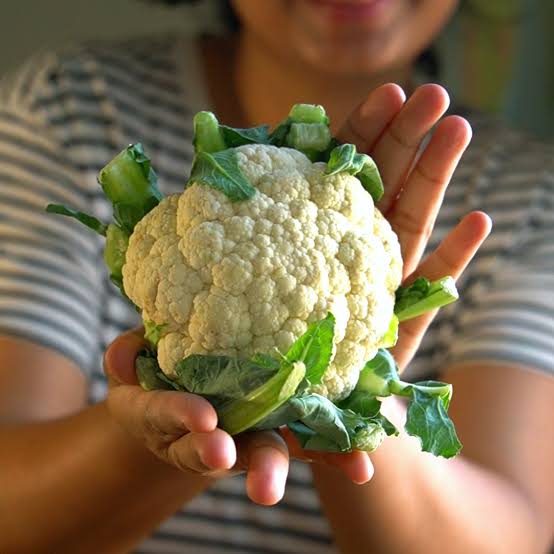It’s high in vitamins C and K, and is also a good source of folate, which supports cell growth and is essential during pregnancy. Cauliflower is fat-free and cholesterol-free. And it’s low in sodium. A one-cup serving contains only 25 calories, 5 grams of carbohydrates and 2 grams of dietary fiber.
Cauliflower contains more B vitamins compared to broccoli, including vitamin B5, vitamin B6 and folate. It also contains the all-important potassium which has a whole host of benefits for our nervous and cardiovascular systems.
Fiber helps maintain healthy digestion, reducing your risk of digestive disorders. It also promotes the growth of good bacteria in your gut. A healthy balance of gut bacteria helps lower inflammation in your body and reduces your risk of heart disease, dementia, and obesity.
Cauliflower is a versatile vegetable that can be enjoyed in various ways. Eating raw cauliflower provides maximum vitamin C content, but cooking cauliflower allows your body to absorb more nutrients, such as vitamin K and potassium
Especially if you have stones in the gallbladder and kidney, you should avoid eating cauliflower. Cauliflower contains calcium which can increase the problem of stones. In case of blood clotting – If you have a problem of blood clotting then do not consume cauliflower at all.
Like broccoli, cauliflower provides a high amount of protein for the number of calories it delivers. Cauliflower has the following protein content : One cup (107 g) of cauliflower contains 2 g of protein. A 100-g serving of cauliflower contains 1.9 g of protein and 25 calories.
Cauliflower is Packed with Powerful Nutrients
Regular rice lacks this important nutrient, making cauliflower rice a better option for supporting brain health. Cauliflower also contains sulforaphane, a sulfur-rich compound known for its potential cancer-fighting properties.
Boil for about 5-7 minutes until tender. Drain well before serving. Roast: Toss cauliflower florets with olive oil, salt, and your favourite spices (such as garlic powder, paprika, or cumin) on a baking sheet. Roast in a preheated oven at 220°C for 20-25 minutes until golden brown and tender, flipping occasionally.
Cauliflower is also a great source of antioxidants, which protect your cells from free radicals and inflammation. It also contains vitamin C, which is an essential component for healthy skin. Vitamin C protects and repairs your skin. It also helps out with collagen production.
Cruciferous vegetables are beneficial in cleaning the colon and liver as well. These type of vegetables are high in fiber, containing up to 40% of the daily requirement for your body in 100 calories. Types of cruciferous vegetables are arugula, bok choy, broccoli, cabbage, cauliflower, horseradish, and turnips.
In fact, cauliflower is a superfood. Superfoods are foods that have an exceptionally high-nutrient content and are very beneficial to the body. Cauliflower is rich in nutrients such as vitamin C, vitamin B6, vitamin K, folate, potassium, magnesium, phosphorus, manganese, fibre and so in.
Cauliflower, a generally healthy vegetable high in vitamin C and vitamin K, low in calories and high in fiber, has hidden risks for some people. One cup of cauliflower per week will provide the health benefits without the risks.
One of the biggest issues is gastrointestinal distress – in other words, gas and bloating. They’re not as serious as a chronic health problem, but they’re still uncomfortable, especially in social situations. Cauliflower is a cruciferous vegetable, like broccoli and Brussel sprouts, which is high in fiber.
Cauliflower is a great food choice for people with diabetes looking to control their blood sugar levels. One of the main reasons for this is its low glycemic index (GI) score. The glycemic index of cauliflower is extremely low (10).

Leave a Reply